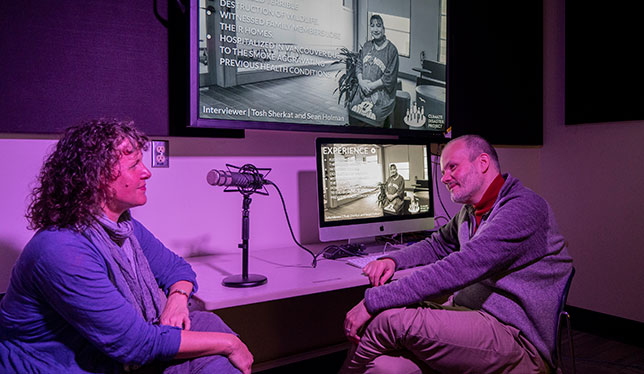It’s easy to feel overwhelmed and hopeless at the spectre of climate change when extreme weather disaster reports and predictions of environmental doom have become increasingly frequent fixtures of the news cycle.
Dealing with those feelings of alienation and finding effective ways to respond are at the heart of the Climate Disaster Project, a course launched in 2021 at the University of Victoria that has since been adopted by more than a dozen other postsecondary institutions across Canada, as well as one in Australia.

The initiative was developed by former journalist Sean Holman, the Wayne Crookes Professor of Environmental and Climate Journalism in UVic’s department of writing. As part of the project, students identify regional climate disasters and compose stories about people who have been impacted by them. “We help these climate disaster survivors share first-hand experiences with the media and the broader public,” said Mr. Holman. “We’re interested in discovering if these first-hand accounts can create communities of action around the experience of climate disaster and help empower those communities.”
A trauma-informed approach
Students from the Climate Disaster Project have spoken with people affected by the winter storm surges that struck the Maritimes in 2022, the intense derecho (a collection of fast-moving thunderstorms with hurricane-force winds) that ripped through southern Ontario and Quebec in 2022, floods that submerged great swathes of B.C.’s Fraser Valley in 2021, wildfires that incinerated the town of Lytton, B.C., in 2021, and several other major weather events.
Rather than pursue conventional interviews with survivors, students use an approach that is sensitive to the trauma that survivors may have experienced as well as collaborative, including co-creating the interview questions. The interviews include information about the survivor’s background and life history, and details about the disaster. “Crucially, we also ask what help they received and what help they were able to give, and also what solutions they see to address climate disaster,” explained Mr. Holman.
It is possible that a collective identity may be emerging as a result of these experiences. As Mr. Holman points out, “We’re all climate disaster survivors in one way or another, whether we have experienced heat waves, wildfires, flooding, or intense storms, but most of us don’t really think of ourselves in that way. And so, we often feel alone in our experience with climate change. But in sharing these stories we can feel less alone, build community, and by building community, we can create hope and take action.”
The catalogue of stories are being published and broadcast by the project’s media partners, including The Aboriginal Peoples Television Network (APTN), Megaphone Magazine, and the Fraser Valley Current. They are then added to a publicly available “memory vault,” of video, audio and text, which will also serve as a resource for investigative journalism projects about climate disasters and a virtual gathering place for anyone who has experienced them. It is hoped that preserving these experiences will enable people to reconnect with each other and create an international community of climate crisis survivors.
Mr. Holman began his role as the new Wayne Crookes Professor of Environmental and Climate Journalism in September 2021. Created through a nearly $1.9-million gift by Vancouver business leader and political activist Wayne Crookes, the position’s goal is to increase the quantity, quality, depth and prominence of science-based environmental journalism and media coverage to address the impacts of climate change and biodiversity loss.